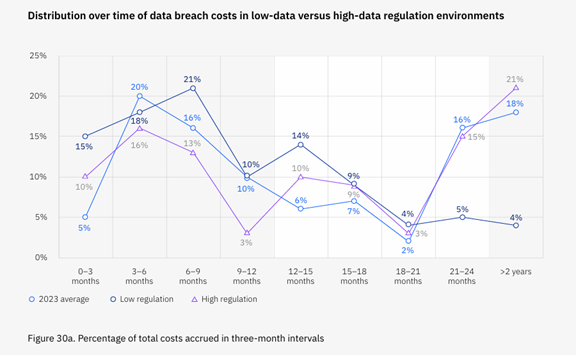In today’s digital world, data is the foundation of business success. It drives operations, informs decisions, and shapes customer experiences. However, lurking beneath this data-driven landscape is the ever-present threat of data breaches.
The consequences of a data breach reach far beyond the immediate damage. Often, the impact lingers for years. Only 51% of data breach costs occur within the first year of an incident, the remaining 49% are felt in the second year and beyond.

We’ll explore the lasting effects of a data breach and analyze a real-world example. You’ll gain insight into how one breach can have long-term consequences that affect a company’s reputation, financial stability, and regulatory compliance.
The Unseen Costs of a Data Breach
Introduction to the First American Title Insurance Co. Case
The 2019 cybersecurity breach at First American serves as a powerful reminder of the far-reaching impacts of data breaches. In this instance, the New York Department of Financial Services (NYDFS) imposed a $1 million fine in the fall of 2023 for the company’s failure to protect sensitive consumer information.
The breach exposed more than 880 million documents, many containing personal and financial data, marking a severe violation of data protection regulations.
This case illustrates how the financial and reputational costs of a breach can linger long after the initial incident. Here are additional ways in which security breaches can continue to affect businesses for years to come.
Lingering Impacts of a Data Breach
Financial Repercussions
The financial impact of a data breach can be profound. Immediate costs include:
- Breach detection
- Containment efforts
- Customer notifications
However, the financial strain doesn’t stop there. Over the long term, businesses face additional expenses, including legal fees, regulatory fines, and compensation for victims. Regulatory penalties are just one aspect of the financial fallout. Other potential costs include legal claims from affected individuals and class-action lawsuits.
Reputation Damage
The damage to a business’s reputation is often the most lasting consequence of a data breach. When customers lose confidence in a company’s ability to safeguard their sensitive information, it can lead to reduced customer retention, challenges in acquiring new customers, and long-term harm to the brand’s image.
Restoring a damaged reputation requires time and deliberate action. This may include launching public relations campaigns and implementing stronger security measures to demonstrate a renewed commitment to protecting customer data and restoring stakeholder trust.
Regulatory Scrutiny
Regulatory agencies are placing greater responsibility on businesses to protect consumer data. A data breach often invites intense regulatory scrutiny, which can result in hefty fines and ongoing compliance demands.
These authorities take a tough approach to data security, holding companies accountable for failing to meet cybersecurity standards. The consequences include financial penalties, heightened oversight, and required enhancements to security protocols.
Operational Disruption
The aftermath of a data breach can severely disrupt business operations. Companies are forced to redirect resources toward remediation efforts and strengthening security measures, which can pull focus away from essential business functions.
This impact ripples across various departments, reducing productivity and efficiency. The long-term effects of operational disruptions can persist for years, stalling growth and making it more difficult for the organization to stay agile in a changing market.
Customer Churn and Acquisition Challenges
A data breach frequently results in customer attrition, as consumers lose trust in the company’s ability to safeguard their personal information. This loss of confidence makes it harder to attract new customers, as potential clients are hesitant to engage with a brand that has experienced a breach. The lasting impact on customer acquisition can stifle the company’s growth and diminish its competitive edge in the market.
A Cautionary Tale for Businesses Everywhere
The consequences of a data breach reach far beyond the initial event, affecting a business’s financial stability, reputation, and regulatory standing for years to come.
As cyber threats grow in both frequency and complexity, proactive cybersecurity measures are no longer optional—they are crucial to securing the long-term success of a business.
The true cost of a data breach often isn’t immediately apparent. It’s a multifaceted issue involving:
- Financial penalties
- Damage to reputation
- Regulatory repercussions
- Operational disruptions
These effects can linger for years, underscoring the importance of a robust and proactive security strategy to mitigate such risks.earn from real-world examples. As well as focusing on robust cybersecurity measures. This helps businesses mitigate the risks associated with data breaches. As well as safeguarding their immediate interests and their long-term viability.
Need a Cybersecurity Assessment to Prevent an Unexpected Breach?
Hackers have various ways to infiltrate a network, from endpoints to cloud-based tools. It’s essential to maintain a strong security posture across all areas. Need assistance?
Book a cybersecurity assessment today to take the first crucial step in identifying and addressing potential risks, while also preventing the costly fallout of a data breach.
Contact us now to arrange a conversation.
